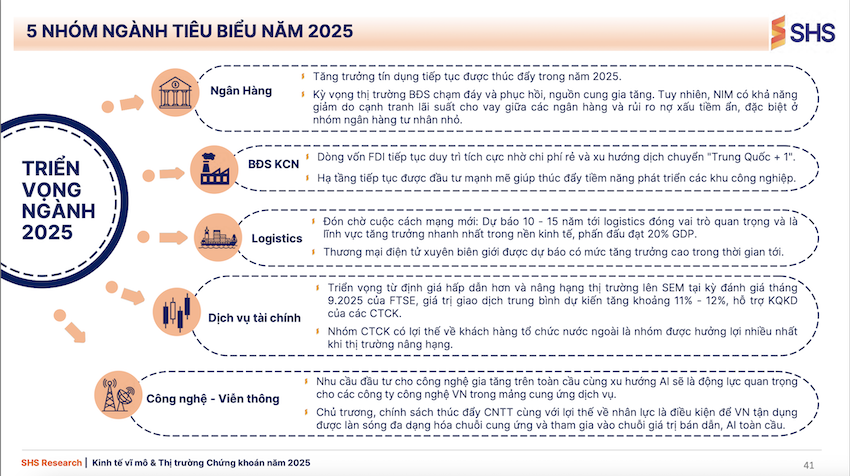US President Donald Trump's announcement of high tariffs on many countries, including Vietnam, is strongly affecting investor sentiment, causing the market to adjust sharply.
SHS Securities Company experts believe that in the world economic flow, Vietnam is not only a bright spot in exports, but also an important link in the restructuring of the global supply chain. But every light comes with darkness: when the trade surplus increases, the pressure to adjust becomes unavoidable.
The tariff challenge is not simply a policy negotiation, but also a test of Vietnam's mettle and flexibility. Avoidance may help delay, but only wise improvisation, taking advantage of the right opportunity, and creating a position one step ahead can help Vietnam avoid falling into a passive position in the big game, according to the SHS expert.
SHS experts have made clear their views since the beginning of the year that the biggest concern for the stock market in 2025 is the Trump 2.0 variable. Markets around the world outside the US are concerned about the policy instability that Donald Trump could cause, similar to the Trump 1.0 period when he first took office as President of the United States. Insecurity breeds fear and anxiety, so although the general market valuation is considered to be cheaper, the market is still very quiet during the waiting period for volatility.
Mr. Nguyen Minh Hanh, Director of SHS Research Analysis Center, said that the viewpoint from the beginning of 2025 expressed in the 2025 strategy report is "Timing is Everything" - a year of special fluctuations and the "timing" factor needs to be put first.
“In the long term, timing is not necessary. But each year like this year is very necessary and essential,” Mr. Hanh shared.
But Mr. Hanh also said that tax policies often change quickly and in the current context, investors should avoid weak companies and can seek "shelter" by investing in leading companies with the internal strength to withstand the crisis.
 |
| 5 typical industry groups in 2025 recommended by SHS. |
After increasing by 12.2% in 2023, in 2024, VN-Index increased by 12.1% - opening up the expectation that VN-Index will have the 3rd consecutive year of increase, retesting the sharp decrease of -33% in 2022. However, in 2025, the price of good fundamental stocks is at a high price level, while other groups of stocks are doing poorly, making it difficult to choose investment opportunities with good valuations for fundamental stocks. In 2025, it is forecasted that VN-Index may have very strong fluctuations with a strong correction of 15 - 20% before the market grows stably again in the medium and long term afterwards.
Another point to note is that in the 2023-2024 period, outstanding margin loans continued to increase and reached a peak of VND 219,358.9 billion at the end of the second quarter of 2024. The debt-to-capitalization ratio of HoSE also set a new high of 4.2%, surpassing the record levels of the first quarter of 2022, when the VN-Index was at 1,500 points.
The increase in the leverage ratio shows that the new cash flow into the market is weaker than the sudden net selling pressure of foreign investors. This is also part of the reason why VN-Index accumulates in a narrow range in 2024.
In 2025, for the VN-Index to grow well, SHS experts believe that the ratio of outstanding margin loans to market capitalization may need to decrease to 3.5-3.7%, equivalent to the peak in 2021-2022. This may improve thanks to reduced net selling pressure from foreign investors, better new cash flow into the market, and good business growth...
Mr. Pham Luu Hung, Chief Economist and Director of SSI Research, Head of Training and Development, SSI Securities Corporation, is not overly optimistic about "bad news becoming good news", because when "it's this bad", somewhere will think about the next actions of the Government will be stronger to solve this problem. For investors, especially foreign investors who have been talking with SSI over the past time, somewhere the tariff risk with Vietnam is the biggest, so they are still waiting, when these risks are shown to be at their worst, they can reconsider investing in Vietnam .
When bad news comes out, foreign investors look at target industries that have more attractive valuations than before. Compared to Vietnam's valuation during the trade war in 2018, when P/E could reach 23-24x, it is now only about half, so the selling pressure is not too strong.
“Information like this can help institutional investors re-evaluate their position in the Vietnamese market, and sometimes it can be in a positive direction,” said Mr. Hung.
Of course, with the psychology of the Vietnamese market, where the transaction rate is dominated by the majority of individual investors, over 90%, there is a certain psychological instability somewhere.
“Just kidding, April 8-9 is the tax day, which is also the day FTSE evaluates the Vietnamese market, so who knows, there might be a reversal on that day. At best, we have two good news at this stage, then the story will be completely different from what we are talking about today,” Mr. Hung shared.
If you choose an industry to consider, prioritize businesses with a large proportion of domestic revenue. Businesses related to many domestic markets such as the electricity industry are quite interesting, there is a lot of pending information such as amending the Electricity Plan VIII, or handling the FIT price of many renewable energy projects. Many investors have given their opinions to the Government and there is a working group to handle this issue, so this story may change. Or related to electricity prices, there is a Decree on reducing retail electricity prices.
Mr. Do Bao Ngoc, Deputy General Director of Vietnam Construction Securities Company (CSI), the 46% tax rate is a surprising figure compared to previous investor expectations. Because previously, most of Vietnam's export items to the US had much lower tax rates. This could cause great difficulties for export enterprises, especially in industries such as textiles, footwear, wood, steel, and electronics - sectors with large export turnover to the US.
However, this could also be a move to put pressure on Vietnam to make adjustments in its trade balance, while speeding up bilateral negotiations with the US to find the most suitable solution.
Global investor sentiment will be negatively affected, as the decision could exacerbate trade tensions and increase concerns about global economic instability.
The US stock market may correct, especially the stocks of multinational companies whose supply chains depend on countries subject to tariffs. In fact, on the afternoon of April 2 local time, the US stock market witnessed a general downward trend right after President Donald Trump announced the imposition of reciprocal rebate tariffs targeting dozens of trading partners. A series of US stock codes fell after trading hours when President Trump announced the imposition of tariffs of at least 10% and even higher on a number of countries and territories, increasing the risk of a global trade war. The Dow Jones index fell 256 points, equivalent to 0.61%; the S&P 500 fell 1.69%; the Nasdaq index fell 2.54%.
In Vietnam, the stock market may react negatively in the short term, with strong selling pressure in key export sectors. On April 3, the VN-Index fell nearly 88 points, about 6.68% compared to the previous session. This is short-term pressure due to the prevailing anxiety, however, if the Government takes appropriate response measures, market sentiment may gradually stabilize.
In the short term, the news of the US imposing high tariffs immediately will have a strong impact on investor sentiment in the stock market. However, Mr. Ngoc believes that we should not panic and sell off, because although high tariffs cause difficulties, the real impact on businesses needs time to be reflected in business results. Along with that, there are many industries that are less affected and have good prospects, such as retail, technology, banking and domestic consumption, which can be safer choices.
In addition, in this context, investors need to monitor the moves from the Government and the international market. If there are positive signals from trade negotiations, the market will soon recover.
In fact, the Vietnamese stock market still has many long-term supporting internal factors such as: expectations of high economic growth, promoting private economic development, boosting public investment, maintaining low interest rates, business recovery... Besides, the market still has high expectations for the possibility of upgrading in the near future and the official operation of the KRX system...
It is undeniable that the US imposing high tariffs on many Vietnamese exports to the US is unfavorable information, however, Mr. Ngoc still believes in the solutions that the Government has implemented and continues to implement to ensure conformity in trade relations with the US in particular and promote economic development in general.
Accordingly, Mr. Ngoc expects the Government to have many bilateral negotiations to find ways to reduce the applicable tax rates, possibly through signing trade agreements or commitments on monetary policy and trade balance. Along with that, Vietnam will continue to promote the domestic market and diversify export markets. Vietnam needs to increase exports to the EU, Japan, and South Korea through trade agreements such as EVFTA and CPTPP.
In addition, the Government needs to have policies to support export enterprises, through solutions to support fiscal policies, credit support, exemption and reduction of transportation and logistics fees... to help enterprises reduce costs.
In addition, according to Mr. Ngoc, Vietnam needs to promote domestic supply chains. If the US imposes high taxes on goods originating from China but produced in Vietnam, Vietnam needs to increase the localization rate to avoid the risk of being taxed on "origin avoidance".
Source: https://baodautu.vn/cuoc-chien-thue-quan-nha-dau-tu-tru-an-vao-cac-co-phieu-nao-d261940.html




































































































Comment (0)